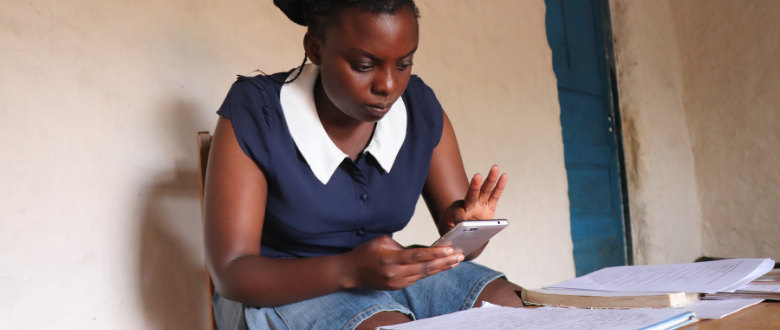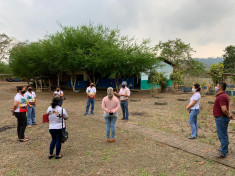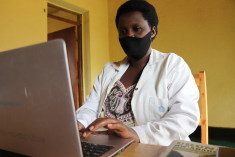
In 2020, COVID-19 slammed the door firmly shut on all aspects of everyday life and it disrupted schooling globally. Across VVOB’s partner countries, school leaders found themselves in the unenviable position of being the pinch point in the education system: relying on guidance from COVID-19 responses and protocols from above and facing serious health and wellbeing issues and huge risk of learning loss around them. School leaders have had to work in demanding and chaotic circumstances, with limited options and no precedents. While it is too soon for definitive conclusions about how to best support school leaders through such a pandemic, some important insights are emerging from Ecuador, Rwanda and Suriname, where VVOB focuses, among other things, on school leadership development.
This story is featured in our 2020 annual report Blended learning: the future of education?. You can download the full report here.
1. Connectedness and connectivity are critical for school leaders
A first set of insights from the COVID-19 crisis is related to the professional learning communities (PLCs) that VVOB promotes as a modality for school leadership development in Ecuador, Rwanda and Suriname. PLCs are a platform where relatively small groups of school leaders meet with the objective of learning with and from each other through solving challenges and sharing good practices.
In all three countries, support to PLCs by VVOB predated the pandemic. The crisis truly brought to light just how important these communities are for school leaders’ rapid learning and wellbeing. Given the myriad of challenges that COVID-19 has created for them, school leaders have a great need to connect, share, learn and network their way through uncharted territory. In this respect, well-facilitated PLCs have much to offer, according to preliminary findings from a research project that VVOB is conducting in Ecuador together with researchers from the Université Catholique de Louvain (UCL).
In focus group discussions, school leaders from the provinces of Manabí and Esmeraldas emphasised just how much the solidarity and unity with colleagues have meant to them during the crisis. A head teacher from Manabí testified, for instance, that as the head teacher of the only secondary technical school in town, he missed having a connection with colleagues, “but here [in the PLC], we solved that and we share knowledge.” Another said that “thanks to the PLC, a group of professionals has been united through the bonds of friendship.” These stories are confirmed by the PLC facilitators, who feel the ties deepening over time as well.

In several districts, the PLCs were in relatively early stages of piloting at the beginning of the pandemic. Asesores – pedagogical counsellors - worried that the switch to online ways of working would be detrimental to the group spirit. While some PLCs welcomed the move to Microsoft Teams, some indeed saw a decrease in participation due to connectivity problems.
With support from VVOB, the asesores drastically shortened the meetings from a whole day face-to-face to maximum two hours online, focused the agenda, and set up WhatsApp and email groups so that school leaders could stay in touch in between realtime meetings. For the most part, this strategy has been successful: in Esmeraldas, the PLCs were able to gather virtually almost as often as they previously met face-to-face; in Manabí, the support helped to kick-start virtual meetings. Though the meetings have gone virtual, the atmosphere of mutual care and learning remains palpable, so the researchers from UCL found.
2. School leaders need to become technologically savvy
The phrase ‘connect to learn, learn to connect’ describes the daily reality of school leaders, teachers and learners trying to work together in this pandemic. Moving forward, school leaders increasingly feel the need to improve their own digital literacy and to be well-informed about the many digital solutions on offer for their schools.
Backed by government policy that considers ICT in education as a strategic lever for transforming Rwanda to a knowledgebased society, VVOB has heavily invested in strengthening school leaders’ ICT capacity since 2017. Already in 2019, the University of Rwanda – College of Education (UR-CE) had a blended diploma course in Effective School Leadership up and running with VVOB’s support, with the first cohort graduating that same year. In 2020, as part of VVOB’s COVID-19 response, the course moved fully online as did all continuous professional development (CPD) courses that UR-CE and VVOB had co-created.

From research and experience, we learnt that investing in school leaders’ ICT capacity is necessary to ensure their engagement in online CPD during and beyond school closures and to assist teachers in effectively delivering distance learning to students. ICT capacity has two pillars: access to ICT equipment (especially laptops) and internet; and ICT skills. For Rwanda’s female school leaders, the learning curve is especially steep as they proved to have less prior experience with ICT and less access to adequate devices. Fortunately, VVOB was able to attract additional funding to deliver laptops to schools in all 30 districts of the country and to enroll, among others, (deputy) head teachers from previously uncovered schools and districts in a course on basic ICT skills for distance and online learning. We have been very encouraged by the positive attitudes that these school leaders have on ICT leadership and the use of ICT.
3. Distributed leadership is becoming the default
A third important insight that emerged “thanks to” COVID-19, is that distributed leadership is becoming the norm rather than the exception. Though Ecuador, Rwanda and Suriname are very different in many respects, a year ago we would have described school leadership in all three countries as a top-down affair, with teachers accountable to head teachers who are, in turn, accountable to their hierarchical superiors at the district and/or national levels. This, however, has changed considerably and maybe even irreversibly because of COVID-19. Staff at all levels of ministries of Education have had to place their trust in school leaders in order to find the most context-responsive answers to the COVID-19 crisis. Similarly, school leaders have had to trust teachers to take on a range of tasks to keep the school community on course.
In Suriname, VVOB’s support to the Sub-Directorate for Lower Secondary Vocational Education and Training (SD LS VET) of the ministry of Education and to the Centre for Continuous Professional Development Suriname (CENASU) helped to accelerate this trend in a number of ways. For one, VVOB has been supporting the introduction of a school-wide support system for newly qualified LS VET teachers since 2017. This included identifying and training school-based mentors who, as teacher leaders, could share head teachers’ responsibility of introducing new teachers to the school community. In 2020, the last batch of 30 school-based mentors was trained and now all of the country’s LS VET schools have such a mentor in place. In parallel, VVOB and the SD LS VET worked together to set up PLCs for school leaders, facilitated by staff from the Sub-Directorate. Topics such as building strong relationships with parents, supporting teachers in classroom management and positive discipline and mentoring new teachers have been high on the agenda of the PLCs. Importantly, facilitating the PLCs has given ministry staff more insight in the ins and outs of the 54 LS VET schools that fall under their authority, while also putting them in a coaching rather than a controlling position.
As VVOB is set to leave Suriname in 2021, we were pleased to crown these achievements with an online workshop week for all LS VET teachers and school leaders, organised at the end of 2020. The last goodbyes from our longstanding partners will not be easy, but we can take our cue from Ecuador and say: “Be well, take care!”
Raising school leadership to the top of the policy agenda has never been more important
Despite ample evidence speaking to the great contribution that effective school leaders make to the well-being and learning outcomes of children and youth, school leadership does not yet receive the policy attention that it deserves. In 2020, VVOB has continued to use its membership in international fora to advocate for school leadership development, especially during a pandemic.
As part of the Teacher Task Force (TTF), VVOB collaborated with UNESCO, the International Labour Organisation (ILO) and other members to put the spotlight on school leaders’ key role in guaranteeing the continuity of learning and safe school reopening. From the onset of the COVID-19 crisis, the TTF called on policymakers to make resources available to train school leaders in recognising signs of distress in teachers and learners and taking appropriate action. The TTF also designed a toolkit to support school leaders in setting priorities, making trade-offs and helping them identify key actions.
In Rwanda, VVOB adapted the TTF toolkit for active use in PLCs for school leaders. The contextualised toolkit stimulated rapid and practical learning on questions that head teachers were facing on a daily basis: How can we ensure distance learning? How do we protect the wellbeing of students and teachers? How do we communicate the reopening of schools? Which strategies can be used during the crisis to maintain hygiene and the security of school materials and property? Supporting collegial learning through PLCs proved to be a very effective response mechanism. VVOB’s work is featured in the second edition of the TTF toolkit.




